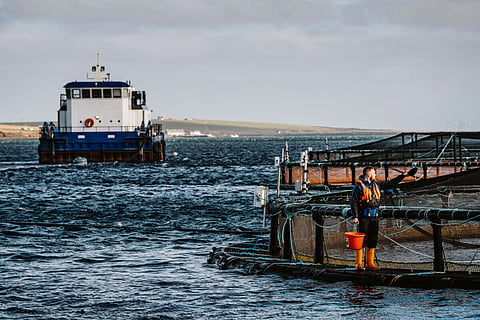

Scottish Sea Farms, jointly owned by Norwegian companies SalMar and Lerøy Seafoods, has decided to voluntarily withdraw from ASC certification, the company has announced.
The decision is described by Scottish Sea Farms as a "pause" in certification.
In a statement on its website, Scottish Sea Farms said that it continues to hold the Aquaculture Stewardship Council's Salmon Standard certification in high regard.
"Its ambition aligns with our own – namely, to set a benchmark for environmentally and socially responsible salmon farming," the company said.
"As such, we have been proud to gain, and just as crucially retain, certification of three farms, with a further three farms currently midway through the certification process."
So why the decision to withdraw from the program?
It seems there has been a difference of opinion between SSF's in-house veterinarians and the protocols required by ASC certification, regarding some aspects of fish health and welfare.
In its statement, Scottish Sea Farms said that recently the ASC Salmon Standard in Scotland has seen "changes that vary from other salmon producing countries and that we believe are not in the best interests of our fish."
"In some instances, certification stipulates that we should intervene in fish health when our own experienced veterinarians have advised that the salmon are best left alone."
"In others, we are required to adopt alternative interventions to the ones our fish health professionals have determined to be most appropriate, having weighed up all the key factors."
"In each case, we have decided in favour of fish health and welfare, presenting a detailed veterinary case for why our fish should be exempted," the company stated.
The company says that while they "still believe wholeheartedly" in the premise of the ASC Salmon Standard, they have chosen to withdraw from the scheme on the grounds of fish welfare.
In its announcement, Scottish Sea Farms indicated that it wanted to discuss the issues with ASC, saying it hoped to help "shape a more informed, science-based Standard that draws on the experiences of those on the front-line of salmon farming."
The ASC (Aquaculture Stewardship Council) standards are a set of criteria and guidelines that define best practices for responsible aquaculture.
The ASC Salmon Standard covers various aspects of salmon production, including environmental impact, social responsibility, and animal welfare.
The ASC certification process evaluates salmon farms against these standards to ensure that they meet the requirements for responsible and sustainable aquaculture practices.
With regards to diseases and parasites, to be ASC-certified under the Salmon Standard, farms need to develop a "Fish Health Management Plan" detailing protocols for biosecurity management, as well as adhering to low levels of parasites - particularly sea lice. Sea lice counts on ASC-certified farms also need to be made publically available.
The ASC Salmon Standard was last updated in 2022, and is revised every 3-5 years.
